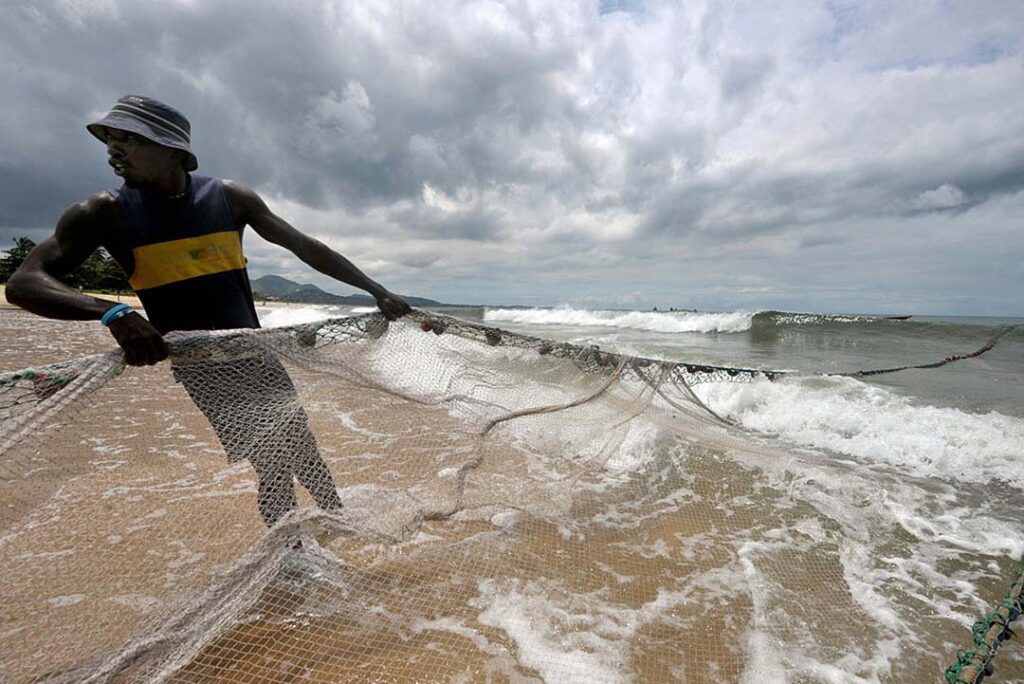ADF STAFF
Aidu Williams has spent 40 years fishing in Goderich wharf on the western axis of Sierra Leone’s Freetown peninsula.
He used to go to sea and return with large coolers full of grouper and snapper in his wooden canoe, but those days are over. Over the past three decades, foreign industrial trawlers have diminished fish populations near shore. Williams and other artisanal fishermen now must venture farther out to sea, often returning with little or no catch.
With so much money spent on fuel, crews sometimes go unpaid after working backbreaking hours on the water.
“Before, we experienced good catches, but now it’s come down,” Williams told Mongabay, a news website that covers environmental science. “Now we’re suffering because of the [foreign] trawlers and the nets they use.”
Williams described “many conflicts” with foreign industrial trawlers that are capable of catching hundreds of times more fish than artisanal canoes. About 75% of the foreign industrial trawlers fishing near Sierra Leone are from China, according to the European Union.
“They come disturb us,” Williams said. “At night they cut their lights and break our anchors. Then problems come.”
China’s distant-water fishing fleet (DWF) is notorious for engaging in illegal, unreported and unregulated (IUU) fishing in Sierra Leone and around West Africa. China commands the world’s largest DWF fleet and is the world’s worst IUU offender, according to the IUU Fishing Index.
The results have been devastating to the roughly 500,000 people who work in Sierra Leone’s small-scale fisheries. Fisheries represent 12% of the economy and provide 80% of the population’s protein consumption, according to United Nations Food and Agriculture Organization Statistics.
Sierra Leonean President Julius Maada Bio has said that IUU fishing costs the country $50 million per year.
In Sierra Leone, industrial trawlers are not allowed to fish closer than 9 to 11 kilometers (5 to 6 nautical miles) from shore. But Williams and other local fishermen say foreign trawlers routinely skirt the law, often at night when they are harder to see, Mongabay reported. Occasionally, larger vessels ram and sink local boats.
It’s hard to determine how many fish are left in Sierra Leonean waters. Due to lack of funding, a long-planned stock assessment has not come to fruition. However, one researcher told Mongabay in 2019 that preliminary findings showed that the nation’s fisheries were “approaching a critical level.”
“The money we generate is not actually enough to fund fish research,” Sheku Sei, an assistant director at Sierra Leone’s ministry of fisheries and marine resources, told the website. “We have to do surveys twice a year to count our fish stocks and know their abundance, but we haven’t been able to do that.”
Nor does the country have enough boats to patrol the coast. When Mongabay visited Goderich, the only government vessel stationed at the wharf was a single-engine dinghy incapable of intercepting an industrial trawler fishing kilometers offshore.
Sei told Mongabay that the government has tried to crack down on illegal fishing. Trawlers must install GPS beacons that connect to the automatic identification systems (AIS) or other satellite monitoring networks, but operators can turn off AIS at any time. Sei said there also are plans to use drones to detect illegal fishing.
However, local fishermen became enraged in 2021 when they learned of a planned a $55 million industrial fishing harbor at Sierra Leone’s tourist-friendly Black Johnson Beach.
Locals and environmental groups started the Save Black Johnson Beach campaign last year, and it has succeeded in pressuring the government to conduct an environmental impact assessment , according to a May 2022 news release. The group claims to have established legal grounds to challenge the project.
The harbor is projected to be built on 100 hectares of beach and pristine rainforests that are home to protected and endangered animal species. The harbor mostly will process fish caught by Chinese trawlers, which then will be exported to China. Locals didn’t know about the deal, which may include a fishmeal factory, until after it was signed.
The government “knows it can’t go ahead” with the project “but refuses to admit it, so the beach and environment are still in real danger,” the release said.
In February, the government concluded site verifications at the beach so that it can compensate landowners affected by the project.

